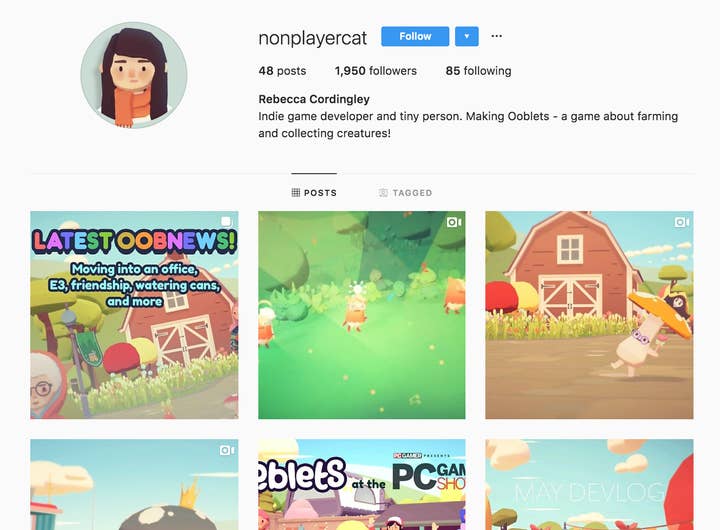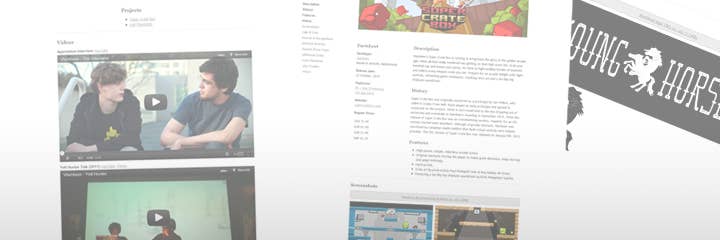The Indie Guide To Marketing
Freelance marketer Bee Wakefield offers devs advice on how to promote their game - and why it takes more than just social media
At the GamesIndustry.biz Career Fair earlier this month, which ran as part of EGX Rezzed, freelance games marketer Bee Wakefield delivered a talk arming new and aspiring advice with valuable advice on how to spread word about their game.
Entitled 'Marketing for indie studios: How and why', it offered tips not only on how to make the most of each social media platform, but also how to promote your game through more traditional means and why this is important. Rather than keeping this insight solely for Rezzed attendees, we asked Bee Wakefield to share her thoughts with GamesIndustry.biz readers.

Today social media tends to sit firmly at the forefront of everyone's minds when we talk about marketing -- with good reason. Between influencer marketing and the fact that social media is free, it's easy to plan marketing campaigns entirely around social.
While social media is an integral part of the process, marketing involves a lot more, and when the other important aspects are ignored we start to see failures where we should see successes.
Many indie studios don't have a large budget set aside for marketing, and though creating and implementing your marketing plan is going to be time consuming if you don't hire a marketer, it can be done with minimal spend.
Marketing is important because:
- It informs: People need to know who you are and what you do.
- It sustains: Marketing helps to sustain sales, healthy customer relationships and that sense of community which is vital if you want your reputation to grow.
- It sells: This one speaks for itself!
There's a misconception in the games industry that marketing is only for AAA games and huge studios, but the reality is that if you want to create a community, want press to pick up on your game, want to find your target audience and want to stand out from the crowd then it's incredibly important that you make and implement a marketing plan. If your game is unique, fun or interesting then you can (and should) market it.
"While social media is an integral part of marketing, when other aspects are ignored we start to see failures where we should see successes"
Marketing today doesn't need to be expensive. The internet means that we can get our games in front of our target audiences for free. Access to information needed to tailor marketing plans and analyse competitors can be found for free, and may social media analytical tools offer free versions of their services. Access to press, podcasts and other media outlets has never been easier, and we should use all this to our full advantage.
The aim of all marketing is to grow your business, and some of the main goals to keep in mind are:
- Consistently represent your game/business/brand
- Be visible across the net
- Stand out from the crowd
- Don't fall behind
- Make those sales!
Target audience
Finding your target audience should be one of the first things you do while creating your marketing plan. Creating a solid analysis will tell you:
- Who is likely to play your game
- Where to find them
- How to communicate with them
- How to use your assets and strategise your campaigns most effectively.
Use games that are similar to yours to gather your data, a few good questions to consider are:
- Who plays them?
- What were their complaints?
- What did they like?
- Where can they be found?
- What are their gaming habits?
Social
Though problems can arise when marketing and PR begins and ends with social media, social is still a vital part of the marketing process today. Over 80% of small businesses use at least one social media platform, and the average time spent on social media is 116 minutes a day. That's a lot of time and a lot of competition.
Social media can be invaluable for:
- Building valuable connections
- Building brand awareness
- Growing your following with minimal or no spend
- Giving your studio and game a voice
"Be genuine. Communities are tired of talking to businesses, they want to talk to a person"
Arguably the most important factor for social media management is to be genuine. Communities are tired of talking to businesses, they want to talk to a person. While professionalism is a must on social media channels, that doesn't mean you shouldn't use your own unique voice in your posts and during your campaigns.
Twitter
Twitter is great for branding -- use your profile picture, your header and the colour scheme options to your advantage here. With almost every games studio having a Twitter account, you want to make sure yours is instantly recognisable.
Use hashtags to your advantage, and keep up with the latest memes and discussion to keep your studio standing out even between campaigns.
Facebook
Though the popularity of Facebook is waning recently, it's still an important platform. Over one billion facebook users speak English, which means that if your budget doesn't account for localisation you have a huge audience of people right there who could play your game.
Conversations on Facebook are much easier to jump into and follow than they are on Twitter, which means that your engagement can go through the roof if you're actively engaging with your audience and encouraging them to talk to each other. Also, ads generally get a better response on Facebook and video ads are perfect for a small trailer. You can tailor your adverts to match your budget.

Instagram
Being image-based, Instagram is arguably the best platform for branding. With clever colour use you can match your style and theme to your game and keep it consistent throughout campaigns.
Making use of Instagram at events is another great way to use the platform, take as many photos and videos as you can to show the hype around your booth.
Creating your following
Start by following people or developers that you already know. Also, try to follow those who like similar games -- hashtags can be useful when trying to find them.
Create fun and interesting campaigns when using social media, and be sure to use popular (but relevant) hashtags. Use these platforms to keep people informed on the development process, and offer your followers something the competitors don't. Always tailor your content to your target audience.
How to increase your social following
Measurement tools such as Hootsuite are a great way to keep track of your social media efforts. With these tools, you can track things like Engagement, follower count, messages by sentiment etc. It's particularly helpful to see what works, what doesn't, and when your audience tends to be the most active.
"Press outlets receive constant emails regarding new releases so do your research before reaching out to the wrong journalists and ending up in their spam folders"
Appear as often as possible on podcasts or offer interviews to the press. Be communicative, open and genuine -- not just in interviews, but in everything else you do.
Try not to falter in your branding -- and make sure you're happy with it before you start. Once you are, run regular social media campaigns and (as with everything you do) target your audience efficiently. Also, don't be afraid to ask for shares and retweets -- this can be an unpopular approach, but it works.
With any social media platform, it's important that you're not afraid to fail. Try something, and if it doesn't work try something else. Trial and error is an important part of starting out with social media.
Press
Press outlets receive constant emails regarding new releases so it's crucial that you do your research before reaching out to the wrong journalists and end up in their spam folders. Identifying relevant press should always be the first step, and that can be as simple as searching for articles on similar games. If a journalist regularly covers games similar to yours, it's a good sign that you should reach out to them.
The rule of not applying to non-relevant journalists should also be kept in mind while approaching publications -- if your game isn't releasing on PS4, don't reach out to PlayStation-exclusive publications by mistake -- this could damage your relationship in the future if you end up flagged as spam.
The most efficient way to receive press attention is with a press kit, a page or document which includes everything that a journalist could possibly need to cover your game:
- Relevant game info (Rating, release date, platforms)
- Story overview
- Screenshots
- Trailers
- GIFs
If it's relevant to the coverage you want, put it in there -- a well-placed GIF or two at the top of a press kit can make the difference between it being viewed or ignored. Try to make your kits as interesting as possible.
If you're struggling with creating your press kit, then Presskit() created by Rami Ismail might help. It's a free tool that makes press kit creation easier and less time consuming.

Prepare for the worst
An important part of marketing is preparing for the worst. If you can avoid it, great -- if not, then having an idea of what issues may arise before they do will help you when you're having to do some damage control.
Consider if any AAA games are being released in your release window. If so, it might be worth pushing the release back.
Is there any potential for negative press? (Does your game cover any sensitive/controversial topics?) Even the most well meaning approach to sensitive topics has the potential to be frustrating to others -- keep general statements ready, just in case
Have similar games encountered problems upon release? What are you going to do if you don't meet your sales targets?
Platforms and sales
Sales promotions, particularly on launch day, can be a great way to boost your game's performance. Ideally, you'll be looking around for sales a little ahead of the submission date cut off, to give you time to weigh the pros and cons and submit. Apply as early as you can.
See what similar titles have done per platform: art, banners, etc. Look into how well similar games have been received on platforms -- the temptation can be to try and release on as many platforms as possible, but if your game isn't well suited to a platform and you're running low on time or budget, set it aside for later.
Marketing can be a lot of work, particularly if you're new to it, but it's incredibly rewarding -- have fun with it!
